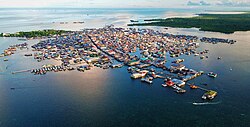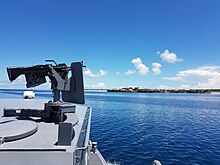| Sitangkai سيتڠكاي | |
|---|---|
| Municipality | |
 Core district of Sitangkai Core district of Sitangkai | |
 Flag Flag | |
| Nickname(s): Venice of the South Southernmost Settlement of the Philippines | |
 Map of Tawi-Tawi with Sitangkai highlighted Map of Tawi-Tawi with Sitangkai highlighted | |
| OpenStreetMap | |
 | |
| Coordinates: 4°39′42″N 119°23′31″E / 4.661528°N 119.391872°E / 4.661528; 119.391872 | |
| Country | Philippines |
| Region | Bangsamoro Autonomous Region in Muslim Mindanao |
| Province | Tawi-Tawi |
| District | Lone district |
| Founded | August 26, 1959 |
| Barangays | 9 (see Barangays) |
| Government | |
| • Type | Sangguniang Bayan |
| • Mayor | Tiblan C. Ahaja |
| • Vice Mayor | Serbin C. Ahaja |
| • Representative | Dimszar M. Sali |
| • Municipal Council |
Members
|
| • Electorate | 25,806 voters (2022) |
| Area | |
| • Total | 792.00 km (305.79 sq mi) |
| Elevation | 1.0 m (3.3 ft) |
| Highest elevation | 200 m (700 ft) |
| Lowest elevation | 0 m (0 ft) |
| Population | |
| • Total | 37,319 |
| • Density | 47/km (120/sq mi) |
| • Households | 6,842 |
| Economy | |
| • Income class | 1st municipal income class |
| • Poverty incidence | 57.62% (2021) |
| • Revenue | ₱ 265.9 million (2020) |
| • Assets | ₱ 213.1 million (2020) |
| • Expenditure | ₱ 258.9 million (2020) |
| • Liabilities | ₱ 0.4235 million (2020) |
| Service provider | |
| • Electricity | Tawi Tawi Electric Cooperative (TAWELCO) |
| Time zone | UTC+8 (PST) |
| ZIP code | 7506 |
| PSGC | 157005000 |
| IDD : area code | +63 (0)68 |
| Native languages | Sama Tagalog Sabah Malay |
| Website | www |
Sitangkai, officially the Municipality of Sitangkai (Tagalog: Bayan ng Sitangkai), is a municipality in the province of Tawi-Tawi, Philippines. According to the 2020 census, it has a population of 37,319 people.
It is the southernmost place in the Philippines and is very close to Malaysia and Indonesia.
It is called the "Venice of the South" due to the use of boats as primary transportation, although footbridges connect one house to another. The major sources of livelihood are fishing and farming, although there is very sparse agricultural land available.
This town is the southernmost town in the whole archipelago, and this town is the southernmost town in the province of Tawi-Tawi.
History


The historical Sitangkai group of islands comprises the islands, areas, and barangays of the present Sitangkai and Sibutu municipalities. The islands had been at the crossroads of the sea trade route and were a traditional enclave of the Bajau and Sama people who for centuries had peacefully lived off fishing and trading. The Kadatuan of Sitangkai and Sibutu were descended from the royalties of Sulu, Sabah, and Sarawak. Historical personalities such as the Datu Iskandar of Sibutu and the Datu Halon of Sitangkai was descended from the Datu Baginda Putih, Datu Baginda Hitam, and the feared Datu Kurunding of Lahat Datu from Borneo (now part of the Malaysian and Indonesian states). In the early 1900s, a man named Lailuddin ibn Jalaluddin from the area of Nunukan, Parang, Sulu was noted to be the first Tausūg to settle in Sitangkai, bringing with him his clan, wealth, and slaves. Together with his sons and nephews, they settled, intermarried, and made alliances with the local traditional leaders and inhabitants. During World War II, Sitangkai and Sibutu, being closer to British Borneo, was targeted by patrols and occasional raids by Japanese Imperial soldiers. Sitangkai nowadays is still a jump off port for traditional traders from Sulu, Zamboanga, mainland Tawi-Tawi going to Sabah and Borneo.
Twenty municipal districts of the then-undivided Sulu, including Sitangkai, were converted into municipalities effective "as of July 1, 1958", by virtue of Executive Order No. 355 issued by President Carlos P. Garcia on August 26, 1959. On October 21, 2006, with the ratification of Muslim Mindanao Autonomy Act No. 197, 16 of its 25 barangays were transferred to the newly created municipality of Sibutu, all of which were located on Sibutu Island.
Geography
Barangays
Sitangkai is politically subdivided into 9 barangays. Each barangay consists of puroks while some have sitios.
- Datu Baguinda Putih
- Imam Sapie
- North Larap
- Panglima Alari
- Sipangkot
- Sitangkai Poblacion
- South Larap (Larap)
- Tongmageng
- Tongusong
Climate
Sitangkai has a tropical rainforest climate (Af) with heavy rainfall year-round.
| Climate data for Sitangkai | |||||||||||||
|---|---|---|---|---|---|---|---|---|---|---|---|---|---|
| Month | Jan | Feb | Mar | Apr | May | Jun | Jul | Aug | Sep | Oct | Nov | Dec | Year |
| Mean daily maximum °C (°F) | 29.7 (85.5) |
29.8 (85.6) |
30.4 (86.7) |
31.1 (88.0) |
31.6 (88.9) |
31.4 (88.5) |
31.3 (88.3) |
31.7 (89.1) |
31.6 (88.9) |
31.3 (88.3) |
30.8 (87.4) |
30.2 (86.4) |
30.9 (87.6) |
| Daily mean °C (°F) | 26.2 (79.2) |
26.3 (79.3) |
26.6 (79.9) |
27.0 (80.6) |
27.4 (81.3) |
27.2 (81.0) |
27.0 (80.6) |
27.3 (81.1) |
27.2 (81.0) |
27.0 (80.6) |
26.8 (80.2) |
26.6 (79.9) |
26.9 (80.4) |
| Mean daily minimum °C (°F) | 22.8 (73.0) |
22.9 (73.2) |
22.9 (73.2) |
23.0 (73.4) |
23.2 (73.8) |
23.0 (73.4) |
22.8 (73.0) |
22.9 (73.2) |
22.8 (73.0) |
22.8 (73.0) |
22.9 (73.2) |
23.0 (73.4) |
22.9 (73.2) |
| Average rainfall mm (inches) | 199 (7.8) |
156 (6.1) |
133 (5.2) |
139 (5.5) |
190 (7.5) |
176 (6.9) |
150 (5.9) |
131 (5.2) |
127 (5.0) |
181 (7.1) |
197 (7.8) |
185 (7.3) |
1,964 (77.3) |
| Source: Climate-Data.org | |||||||||||||
Demographics
| Year | Pop. | ±% p.a. |
|---|---|---|
| 1903 | 1,155 | — |
| 1918 | 6,598 | +12.32% |
| 1939 | 6,812 | +0.15% |
| 1948 | 9,228 | +3.43% |
| 1960 | 10,624 | +1.18% |
| 1970 | 13,738 | +2.60% |
| 1975 | 15,066 | +1.87% |
| 1980 | 27,419 | +12.72% |
| 1990 | 34,493 | +2.32% |
| 1995 | 36,027 | +0.82% |
| 2000 | 52,772 | +8.53% |
| 2007 | 40,641 | −3.54% |
| 2010 | 30,514 | −9.90% |
| 2015 | 33,334 | +1.70% |
| 2020 | 37,319 | +2.25% |
| Source: Philippine Statistics Authority | ||
Economy
Sitangkai is often referred to as the "Venice of the South" with boats being the primary mode of transportation within the town. Its location as the southernmost town in the Philippines makes the town as a trading port for transporting goods to and from neighboring Malaysia.
Poverty Incidence of Sitangkai
|
10
20
30
40
50
60
2006 36.60 2009 31.68 2012 23.79 2015 28.85 2018 24.03 2021 57.62 Source: Philippine Statistics Authority |
Healthcare
As of 2021, there is no hospital in Sitangkai.
References
- Municipality of Sitangkai | (DILG)
- "2015 Census of Population, Report No. 3 – Population, Land Area, and Population Density" (PDF). Philippine Statistics Authority. Quezon City, Philippines. August 2016. ISSN 0117-1453. Archived (PDF) from the original on May 25, 2021. Retrieved July 16, 2021.
- ^ Census of Population (2020). "Bangsamoro (BARMM)". Total Population by Province, City, Municipality and Barangay. Philippine Statistics Authority. Retrieved 8 July 2021.
- "PSA Releases the 2021 City and Municipal Level Poverty Estimates". Philippine Statistics Authority. 2 April 2024. Retrieved 28 April 2024.
- Santillan, Glen (19 May 2015). "IN PHOTOS: 5 places to see in breathtaking Tawi-Tawi". Rappler.
- Garcia, Teofilo Jr. (29 December 2021). "Marines build sovereignty marker in Tawi-Tawi remote island". Philippine News Agency. Retrieved 17 March 2024.
- "Executive Order No. 355, s. 1959". Official Gazette (Philippines). Government of the Philippines. August 26, 1959. Retrieved March 13, 2023.
- "Climate: Sitangkai". Climate-Data.org. Retrieved 25 October 2020.
- Census of Population (2015). "ARMM – Autonomous Region in Muslim Mindanao". Total Population by Province, City, Municipality and Barangay. Philippine Statistics Authority. Retrieved 20 June 2016.
- Census of Population and Housing (2010). "ARMM – Autonomous Region in Muslim Mindanao" (PDF). Total Population by Province, City, Municipality and Barangay. National Statistics Office. Retrieved 29 June 2016.
- Censuses of Population (1903–2007). "ARMM – Autonomous Region in Muslim Mindanao". Table 1. Population Enumerated in Various Censuses by Province/Highly Urbanized City: 1903 to 2007. National Statistics Office.
- "Province of Tawi‑tawi". Municipality Population Data. Local Water Utilities Administration Research Division. Retrieved 17 December 2016.
- ^ Francisco, Carmelito Q. (2 October 2021). "Bangsamoro lawmaker wants hospital built in southernmost town of PH". Philippine Daily Inquirer. Retrieved 4 October 2021.
- "Poverty incidence (PI):". Philippine Statistics Authority. Retrieved December 28, 2020.
- "City and Municipal Level Poverty Estimates; 2006 and 2009" (PDF). Philippine Statistics Authority. 3 August 2012.
- "2012 Municipal and City Level Poverty Estimates" (PDF). Philippine Statistics Authority. 31 May 2016.
- "Municipal and City Level Small Area Poverty Estimates; 2009, 2012 and 2015". Philippine Statistics Authority. 10 July 2019.
- "PSA Releases the 2018 Municipal and City Level Poverty Estimates". Philippine Statistics Authority. 15 December 2021. Retrieved 22 January 2022.
- "PSA Releases the 2021 City and Municipal Level Poverty Estimates". Philippine Statistics Authority. 2 April 2024. Retrieved 28 April 2024.
External links
- Sitangkai Profile at PhilAtlas.com
- Philippine Standard Geographic Code
- Sitangkai Profile at the DTI Cities and Municipalities Competitive Index
- Philippine Census Information
| Places adjacent to Sitangkai | ||||||||||||||||
|---|---|---|---|---|---|---|---|---|---|---|---|---|---|---|---|---|
| ||||||||||||||||
| Bongao (capital) | |
| Municipalities | |